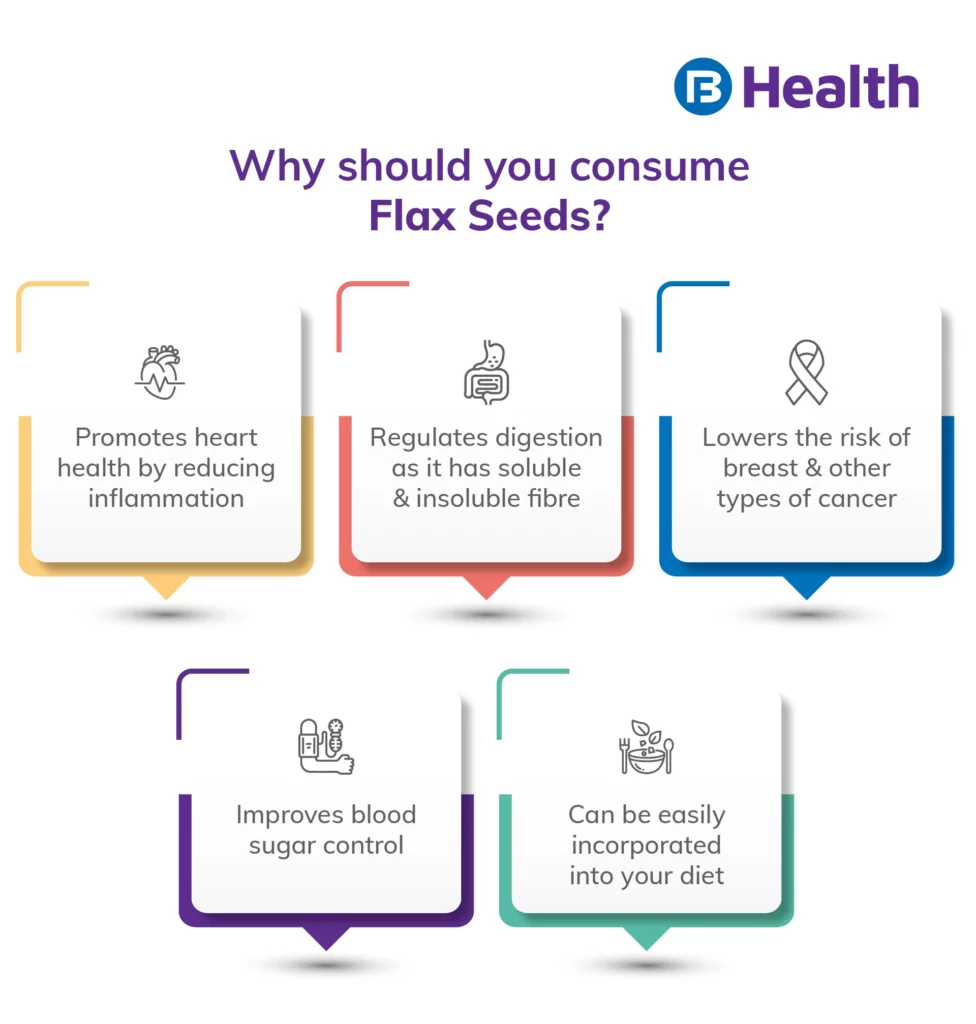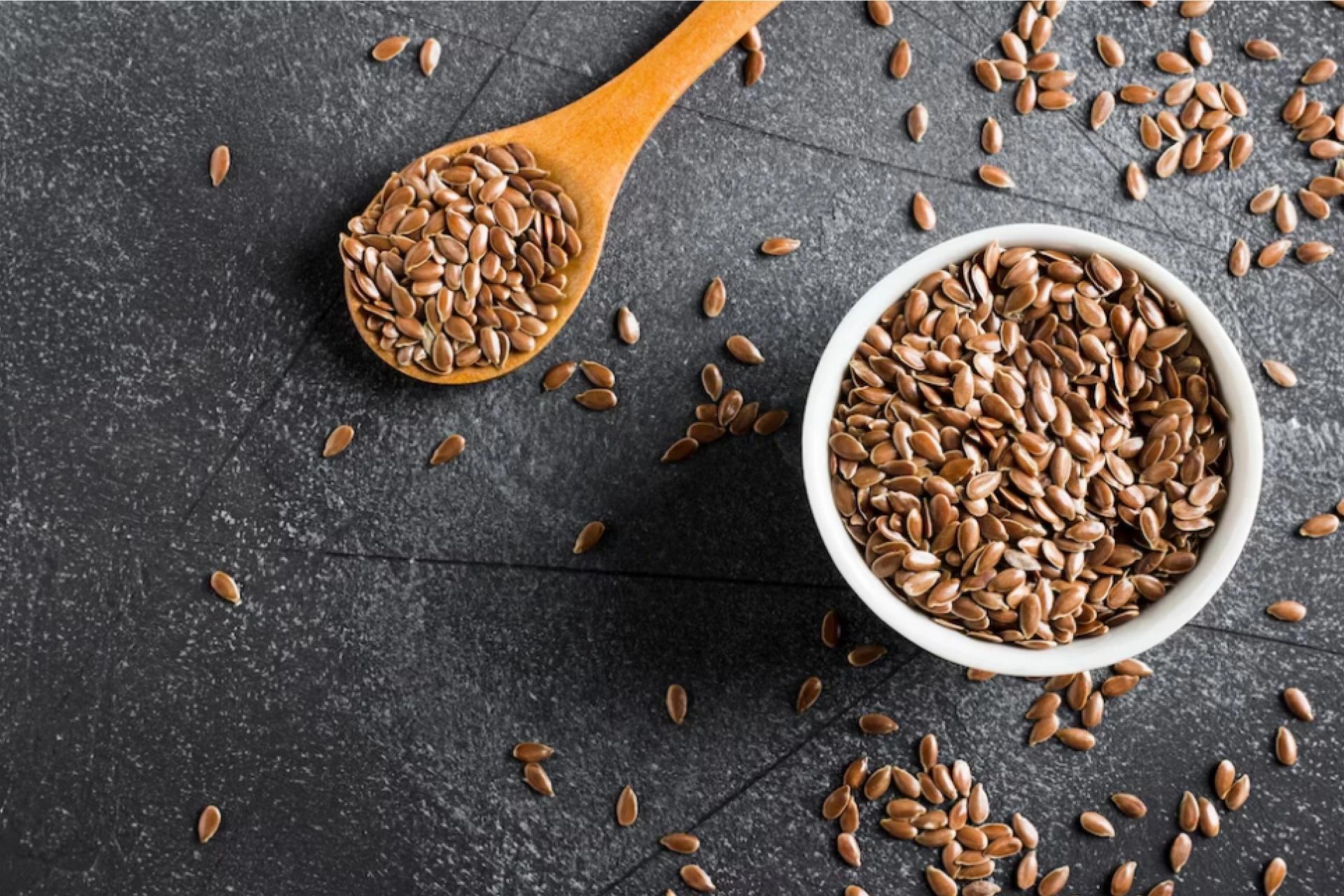Nutrition | min read
Flaxseeds: A Nutrient-Packed Superfood for Better Health
Medically reviewed by
- Table of Content
Synopsis
Learn about the incredible health benefits of flaxseeds, a nutrient-dense superfood rich in omega-3 fatty acids and fibre. Discover how incorporating them into your diet can improve heart health, aid digestion, and support weight management.
Key Takeaways
- Flaxseeds offer a range of health benefits, including improved heart health and digestion
- They are easy to incorporate into your diet and can support weight management
- It's important to consume flaxseeds in moderation and seek advice from a healthcare professional if you have any concern
What are Flaxseeds?
Flaxseeds, also known as linseeds, are small, golden or brown-coloured seeds obtained from the flax plant (Linum usitatissimum), a member of the Limacine family. Flax is typically grown in cooler regions of the world such as Canada, Russia, and China. Flaxseeds have been used for their medicinal properties for centuries and are a rich source of various nutrients, including the benefits of flaxseeds.
Flaxseeds are packed with dietary fibre, protein, healthy fats, and essential nutrients such as omega-3 fatty acids, lignin, vitamins, and minerals. Flaxseeds have a mild, nutty taste and can be eaten whole, ground, or in oil form. However, whole flaxseeds have a hard outer shell that makes it difficult for the body to digest, which is why it's better to grind them before consumption to maximize the benefits of flaxseeds.
Flaxseeds contain two essential omega-3 fatty acids: alpha-linolenic acid (ALA) and lignans. ALA is an essential fatty acid that cannot be produced by the body naturally and must be obtained through diet. Lignins are a type of phytoestrogen that have anti-cancer properties and can have oestrogen-like effects in the body, which are some of the key benefits of flaxseeds.
Flaxseeds can be added to various foods, such as smoothies, yoghurt, oatmeal, and baked goods, to enhance the flax seeds' nutritional value. In addition, there are various flaxseed oil benefits, as it can also be used as a cooking oil or salad dressing.
While flaxseeds offer numerous health benefits, it is important to consume them in moderation. It is also recommended to consume ground flaxseeds rather than whole seeds to improve their digestibility and nutrient absorption.
Additional Read: High Fiber Foods For Diabetics

Top 10 Flax Seeds Health Benefits for You
1. Rich in nutrients
There are various benefits of flaxseeds as they contain essential nutrients that are beneficial for overall health. They contain high amounts of dietary fibre, protein, omega-3 fatty acids, lignans, and vitamins and minerals such as thiamine, magnesium, and phosphorus.
Additional Read: Omega 3 Fatty Acids2. It may help improve digestive health
Amongst various benefits of flaxseeds, improving digestive health is an effective one. The high fibre content of flax seeds can help promote healthy digestion by supporting regular bowel movements and preventing constipation. Additionally, the lignin's present in flax seeds have been found to possess anti-inflammatory properties that help in reducing inflammation in the digestive system and promote healthy gut bacteria.
3. It may help reduce the risk of acquiring heart disease
Flaxseeds, as you might know, are a rich source of omega-3 fatty acids which add to the multiple benefits of flaxseeds. These compounds have been found helpful in reducing the risk of heart disease. Omega-3 fatty acids help reduce inflammation, lower blood pressure, and improve cholesterol levels, contributing to a lower risk of heart disease.
4. It may help improve blood sugar control
The high fibre content of flax seeds can help slow down glucose absorption in the bloodstream, which may help improve blood sugar control. This is among the top benefits of flaxseeds. Additionally, the lignans present in flax seeds have been found to possess anti-diabetic properties that may help improve insulin sensitivity.
5. May help reduce the risk of cancer
One of the greatest benefits of flaxseeds is that they can reduce cancer risk. The lignin's in flaxseeds have been found to possess anti-cancer properties that may help to reduce the risk of various types of cancer, such as breast, prostate, and colon cancer. Additionally, the high fibre content of flax seeds may help to reduce colon cancer risk by promoting regular bowel movements and preventing the build-up of harmful substances in the colon.
6. May help lower cholesterol
The soluble fibre in flaxseeds binds with cholesterol and bile acids in the digestive tract, which helps prevent the absorption of cholesterol into the bloodstream. This can decrease LDL (bad) cholesterol levels in the body, which can lower the risk of developing heart disease. Therefore, one of the major benefits of flaxseeds is that it helps to lower cholesterol.
7. It may help manage blood sugar
Flax seeds have a low glycaemic index, which means they are digested slowly and do not cause a rapid spike in blood sugar levels. Additionally, the high fibre content in flaxseeds helps to slow down glucose absorption in the bloodstream, thereby regulating blood sugar levels and reducing the risk of developing type 2 diabetes. Isn't this one of the most notable benefits of flaxseeds?
8. May support heart health
The omega-3 fatty acids present in flaxseeds have been shown to have anti-inflammatory effects, which might help in reducing the risk of developing heart disease acting as one of the valuable benefits of flaxseeds. Additionally, lignans found in flax seeds can help reduce blood pressure and improve blood vessel function, further supporting heart health.
9. May improve skin health
The essential fatty acids in flax seeds can help keep skin hydrated and healthy. Additionally, the lignin's in flax seeds have antioxidant properties that help protect the skin from damage caused by free radicals and reduce the appearance of fine lines and wrinkles. You can utilize these benefits of flaxseeds to improve skin health.
10. Flax seeds for weight loss
The best benefit among the many benefits of flaxseeds includes weight loss. Flax seeds' high fibre and healthy fat content can promote feelings of fullness and reduce your appetite, which can aid in weight loss efforts. Additionally, the lignin's in flax seeds have osteogeny-like effects in the body, which may help regulate metabolism and aid in weight management.
Overall, incorporating flax seeds into your diet can provide numerous health benefits. Still, it is essential to consume them in moderation and consult a healthcare professional if you have any concerns or questions.
Additional Read: Ayurvedic Medicine For Constipation
What is the nutrition value of Flax Seeds?
A 1-ounce (28-gram) serving of flaxseeds contains the following nutrients:
- Calories: 152
- Protein: 5.2 grams
- Total Fat: 12.2 grams
- Carbohydrates: 8.2 grams
- Dietary Fibre: 7.7 grams
- Sugars: 0.6 grams
- Calcium: 26 mg
- Iron: 1.9 mg
- Magnesium: 79 mg
- Phosphorus: 117 mg
- Potassium: 152 mg
- Sodium: 5 mg
- Zinc: 1.0 mg
- Vitamin C: 0.6 mg
- Thiamine: 0.2 mg
- Riboflavin: 0.1 mg
- Niacin: 0.6 mg
- Vitamin B6: 0.1 mg
- Folate: 8.2 mcg
- Vitamin E: 0.3 mg
- Vitamin K: 1.3 mcg
Various Flax Seeds Side Effects you Must Know
Despite the multiple benefits of flaxseeds, consuming them in large quantities can lead to certain side effects. Here are the potential side effects of eating flaxseeds:
1. Digestive issues
Flaxseeds are high in fibre, which is great for digestive health, but consuming too much fibre can cause digestive issues such as bloating, gas, diarrhoea, and constipation. Therefore, it is recommended to start with a small number of flaxseeds and gradually increase the intake over time to prevent digestive issues.
2. Hormonal imbalance
There are flax seeds benefits for females as they contain phytoestrogens, which are plant compounds that can mimic the effects of oestrogen in the body. While this can benefit women going through menopause, consuming too much flaxseed can cause hormonal imbalance in both men and women, leading to infertility, breast tenderness, and mood changes.
3. Allergic reactions
Flaxseeds can cause allergic reactions in some people, especially those with allergies. Symptoms of an allergic reaction mostly includes hives, itching, swelling, and difficulty breathing. If you experience these symptoms after consuming flaxseeds, seek medical attention immediately.
4. Drug interactions
Flaxseeds can interact with certain medications, including blood thinners, hormone therapy drugs, and cholesterol-lowering medications. If you take any of these medications, consult a healthcare provider before adding flaxseeds to your diet.
5. Cyanide toxicity
Flaxseeds contain small amounts of cyanogenic glycosides, which can release cyanide when broken down by the body. However, the levels of cyanide in flaxseeds are too low to cause any harm, and consuming moderate amounts of flaxseeds is generally considered safe.

What are the different ways to eat Flax Seeds?
Flax seeds can be a versatile and nutritious addition to your diet. Here are some ways to eat flax seeds:
1. Ground flaxseeds
Ground flaxseeds are the easiest way to consume flax seeds, as they are easier to digest and can be added to various dishes. For example, you can add ground flaxseeds to smoothies, yoghurt, and oatmeal or sprinkle them on top of salads, soups, or baked goods.
2. Flaxseed oil
Flaxseed oil is a concentrated source of omega-3 fatty acids and can be used as a healthy alternative to other cooking oils. You can use flaxseed oil for sautéing, frying, or as a salad dressing. However, flaxseed oil should not be used for high-heat cooking, as it has a low smoke point.
3. Whole flaxseeds
Whole flaxseeds can be added to recipes such as bread, muffins, and granola for added nutrition and texture. However, it's essential to grind the whole flaxseeds before consuming them, as the hard-outer shell is difficult to digest.
4. Flaxseed milk
Flaxseed milk is a dairy-free alternative to milk that can be made by blending ground flaxseeds with water. Flaxseed milk is high in omega-3 fatty acids and can be used in smoothies, cereal, or as a substitute for milk in recipes.
5. Flaxseed flour
Flaxseed flour is a gluten-free flour that can be used in baking recipes. Flaxseed flour is high in fibre and protein and can be substituted for all-purpose flour in recipes such as muffins, bread, and pancakes.
Properly storing flax seeds is essential to maintain their freshness and nutritional value. They can be stored in an airtight container in the refrigerator for up to six months. When buying flaxseeds, it's best to choose whole seeds and grind them at home for optimal freshness and nutrient absorption.
FAQs
1. How much flaxseed should I consume daily?
It is recommended to consume 1-2 tablespoons of ground flaxseed per day to utilise the benefits of flaxseed.
2. Are there any side effects of consuming flaxseeds?
Flaxseeds are generally safe for consumption, but excessive consumption may cause gastrointestinal issues such as bloating, gas, and diarrhoea. It is often said to consume them in moderation.
3. Can flaxseeds help with weight loss?
Yes, the high fibre and healthy fat content in flaxseeds can help promote feelings of fullness and reduce appetite, aiding in weight loss efforts.
4. Can flaxseeds help reduce the risk of heart disease?
Yes, the omega-3 fatty acids present in flaxseeds have been found to help reduce inflammation, lower blood pressure, and improve cholesterol levels, all of which can contribute to a lower risk of heart disease.
5. Can flaxseeds be consumed during pregnancy?
Yes, flaxseeds can be consumed during pregnancy as they are a rich source of essential nutrients such as omega-3 fatty acids, fibre, and lignans. However, it is recommended to consult a healthcare provider before consuming flaxseeds during pregnancy.
To summarize, flax seeds offer a range of health benefits and can be easily incorporated into your diet. However, consuming them in moderation is important and consulting a healthcare professional if you have any concerns is essential.
For more information on healthy eating habits, you can get an online doctor consultation on Bajaj Finserv Health and the ability to consult a dietician. You can also find informative health blogs and articles on their website. Take the first step towards a healthier lifestyle by adding flax seeds to your diet and seeking out resources from Bajaj Finserv Health.
- References
- Disclaimer
Please note that this article is solely meant for informational purposes and Bajaj Finserv Health Limited (“BFHL”) does not shoulder any responsibility of the views/advice/information expressed/given by the writer/reviewer/originator. This article should not be considered as a substitute for any medical advice, diagnosis or treatment. Always consult with your trusted physician/qualified healthcare professional to evaluate your medical condition. The above article has been reviewed by a qualified doctor and BFHL is not responsible for any damages for any information or services provided by any third party.



